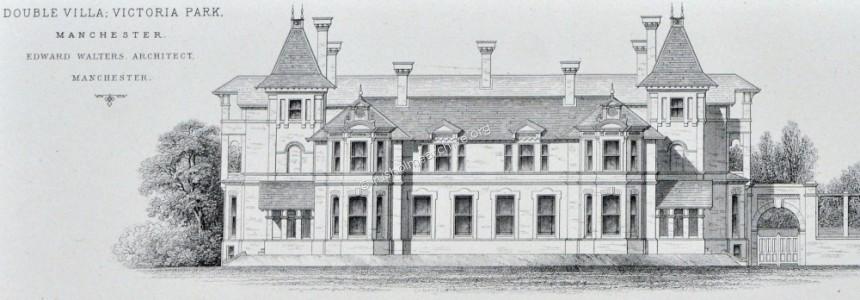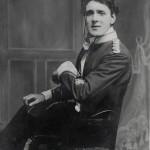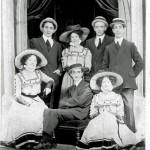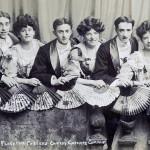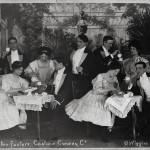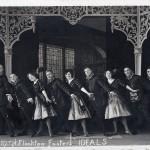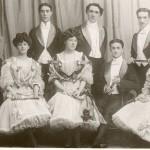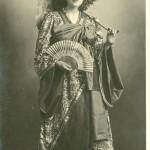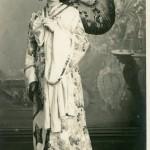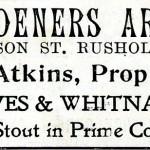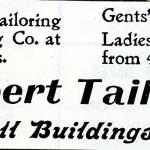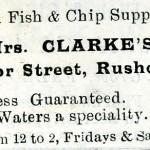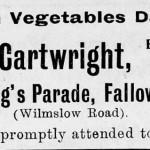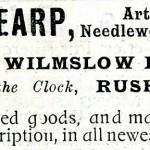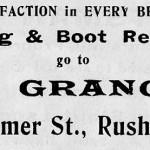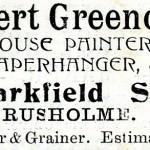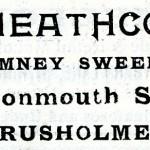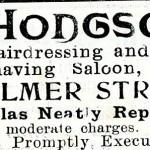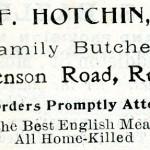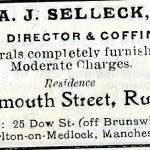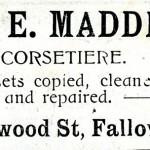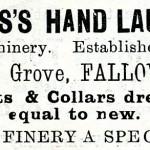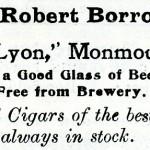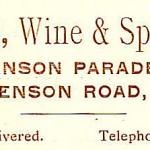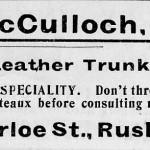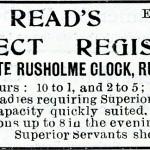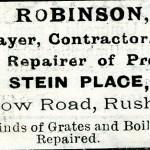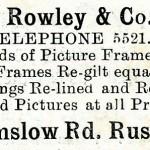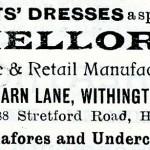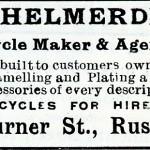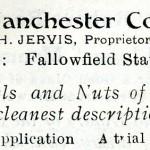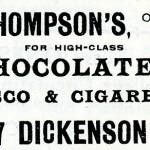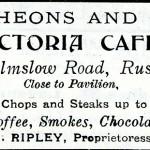Rusholme & Victoria Park Archive
Harry Leslie's Rusholme Pavilion.
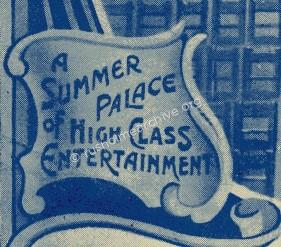
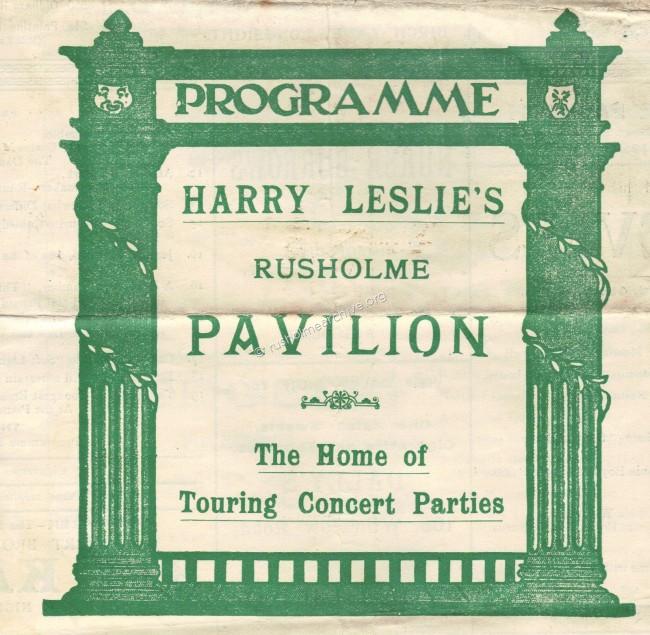
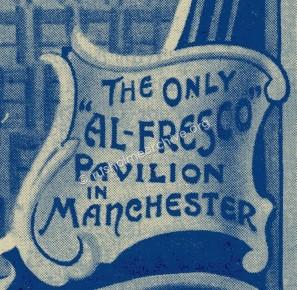
Harry Leslie's Rusholme Pavilion is more than a distant memory for most people. The exact date that performances started here is a little unclear, there may have been some summer-time only shows dating back to 1903 but the earliest printed programmes date from 1908. I have been very fortunate in being able to prepare this page with some detailed information provided by a Rusholme resident whose late husband, Tom Egan, had collected memorabilia about Harry Leslie. Some of this was published in the Rusholme Times in 1980 and at that time there were still enough residents who had memories of the Pavilion who then sent in their letters and recollections about Harry and the Pavilion. As some of the letters were written by residents who said they were upwards of 80 +, (one was 91) we can safely assume that they had a firsthand knowledge! These original letters together with some programmes from 1908-9 have now been passed to the rusholmearchive and have proved to be a valuable resource. I am very grateful to Mrs Egan for being given this material for publication.
The site of the Rusholme Pavilion was on the southern side of the Birch Villa, (now called Hardy's Well). You can see it in the map below dated 1934 just near the corner of Wilmslow Road and Dickenson Road. For all of its life the Pavilion was unseen to the passing public because the plot of land was shielded from Wilmslow Road by very high advertising hoardings. These hoardings are in the photograph below and to the right of the Birch Villa, Image courtesy of Manchester Libraries.
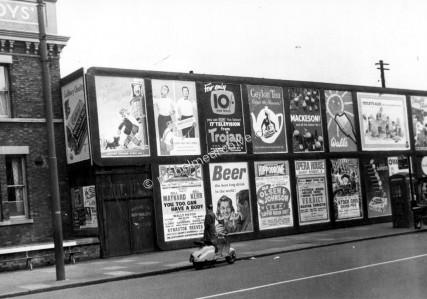
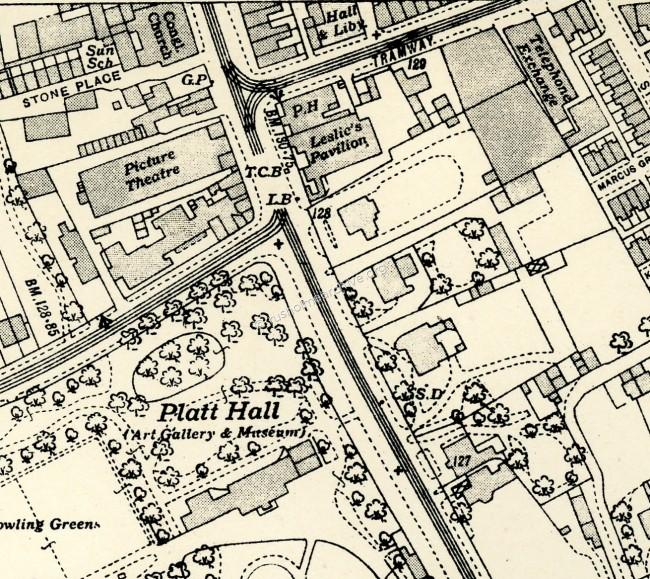
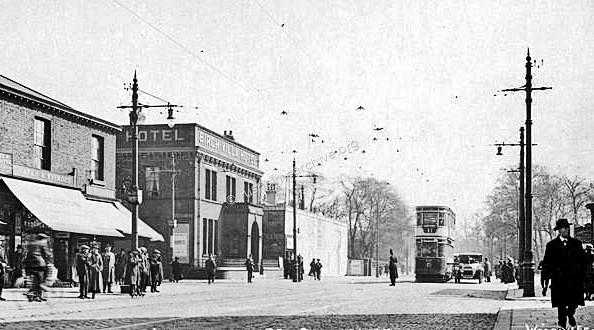
Programme cover for May 10th 1909 below
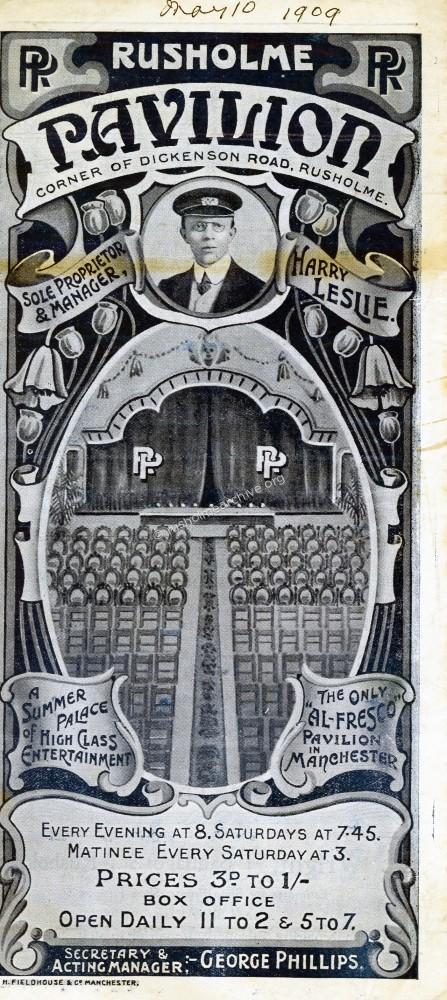
Harry Leslie was born in Blackburn in 1871, the son of a public schoolmaster. His surname was in fact Makinson, but he always said that 'Harry Makinson' was too long for a stage name. He worked in the textile industry and at the age of 30 in the 1901census was identified as a book-keeper. He was an amateur ventriloquist and when he won ten gold sovereigns at a talent spotting competition in Sheffield he decided to pursue a career on and behind the stage.
First mention of Harry Leslie in the Evening News advert 30th September 1893
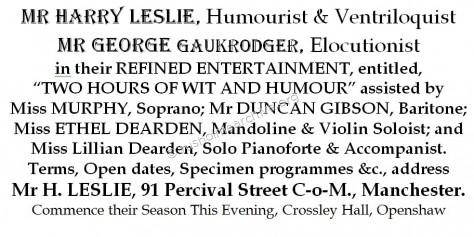
He was first mentioned in Rusholme for helping to provide entertainment to children at a Coronation celebration in 1902, but he started his summertime only 'al fresco' shows in 1903-04 under a marquee adjoining the Birch Villa. He was determined to provide the shows that holiday makers enjoyed at the 'end of the pier', sometimes referred to as concert parties.
The picture postcard below is from Scarborough in 1906. It clearly illustrates how popular the ‘Concert Parties’ were. There was no charge to watch the entertainment, a show perhaps being put on three or four times daily. However as soon as the show was over the entertainers would go round with a hat and hope to make a reasonable collection. The group in the postcard below is Will Catlins Pierrots who became very successful.
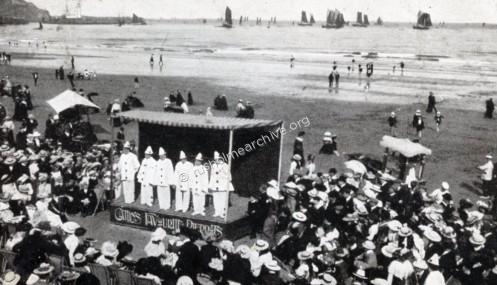
Harry Leslie opened the Rusholme Pavilion in 1904 for a summer season. Best described as 'rustic' (?) it was a canvas marquee which provided form and deck chair seating for the patrons and two wooden huts for the artistes dressing rooms. In the Stage and Field magazine April 24th 1905 Leslie announced that "the pavilion had been extensively altered since last summer. The structure and canvas roof had been altered, the ground sloped so that 700 people had a good view'' and that "the pavilion will be warm and cosy on wet and cold nights and fresh and cool on hot nights".
The photograph below was taken July 13th 1905 to celebrate a Royal Visit to Manchester by King Edward VII and Queen Alexandra. As this postcard view below is probably the earliest interior view following the April 24th improvements it nevertheless still looking pretty spartan!
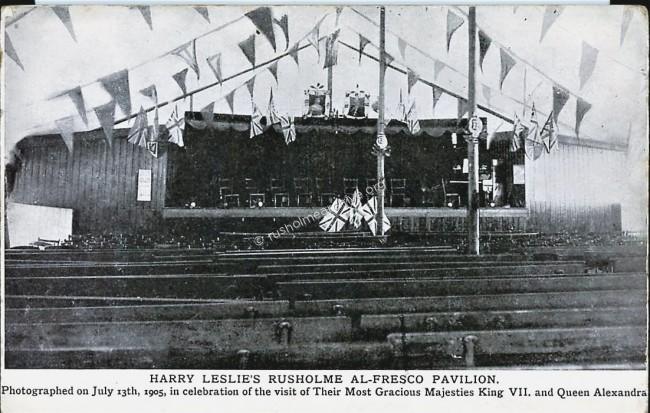
The picture below is of his first pierrots troupe, apparently recruited from local Rusholme talent. Harry Leslie is sitting centre, wearing a Homburg hat.
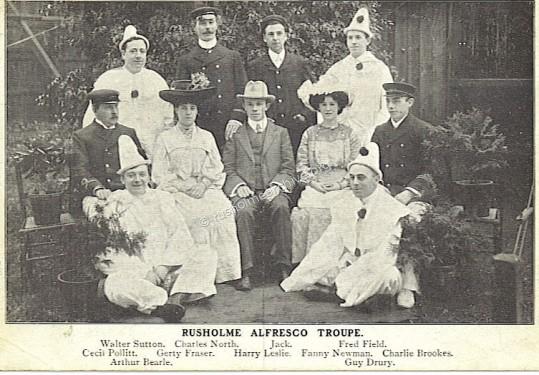
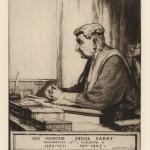 An interesting story appeared in the Manchester Guardian in 1907 when a tentmaker started an action against Harry Leslie in the County Court. It seems that a canvas roof was made, measuring 50 ft x 64ft to cover the roof of the Pavilion and was to cost Harry Leslie £47, however it might not have been quite big enough because it leaked and the rain came in and soaked the audience!
An interesting story appeared in the Manchester Guardian in 1907 when a tentmaker started an action against Harry Leslie in the County Court. It seems that a canvas roof was made, measuring 50 ft x 64ft to cover the roof of the Pavilion and was to cost Harry Leslie £47, however it might not have been quite big enough because it leaked and the rain came in and soaked the audience!
Harry Leslie made a counterclaim for £30 of lost business, (bear in mind seats were three pence to one shilling) and he called a witness, Eugene Elgar.
Mr Elgar claimed that he was a regular visitor to the Pavilion but had been asked to leave because he had insisted on putting his umbrella up to keep off the rain. The judge interrupted and asked if he knew it was going to be wet why did he not wear a macintosh or a bathing suit! Elgar replied he did not mind the rain but the ladies would not use the seating because of the wet conditions! After further exchanges between the lawyers the Judge found for both sides - he ordered Leslie to pay the outstanding sum less his loss.................
Judge Parry who heard this case was himself clearly at home in theatrical circles as he was an author & playwright of children's stories. One of his books, Katawampus was staged in 1924 at the Rusholme Theatre. See the photograph below.
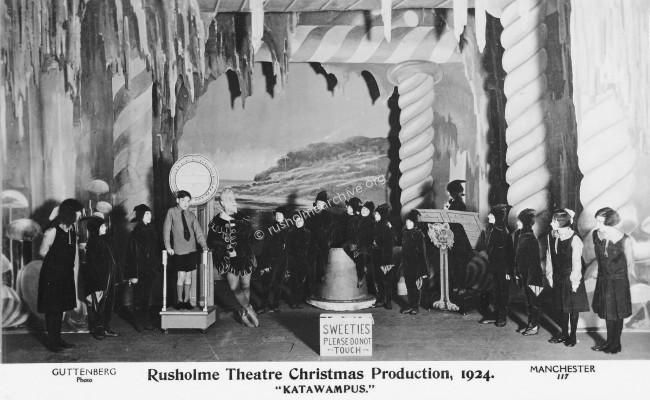
To the present date there is no photograph of the exterior of the concert hall, but I have a photograph of the interior that quite matches the description of the interior and gives a good sense of the atmosphere from a letter written in 1980. Mrs Ethel Walmsley of Hathersage Road said,
'I was a regular going every week to Leslies in the good old, bad old days - we lived at Belle Vue and used to get the 53 tramcar down to the Birch Villa. The concert parties were like those we saw on holidays at the Piers & Pavilions. The theatre itself was an intimate little place, tip-up plush seats with lace covers were 1/6d, other tip-up seats were 1/-, then to sit on forms were 9d, there was also a promenade along the sides, standing there cost 6d. We had some happy & enjoyable nights there and the memories remain with us. It was very sad for us regulars when Leslies had to close down after so many happy years when the heart was young and we were enjoying it so much.'
The photograph below of the interior of Harry Leslie's Rusholme Pavilion is dated 1915. The tented roof would appear to be held up by the three posts in the centre of the picture, the plush seats in the front rows and the wooden forms at the rear. Also interesting is the back-drop of local advertisements!
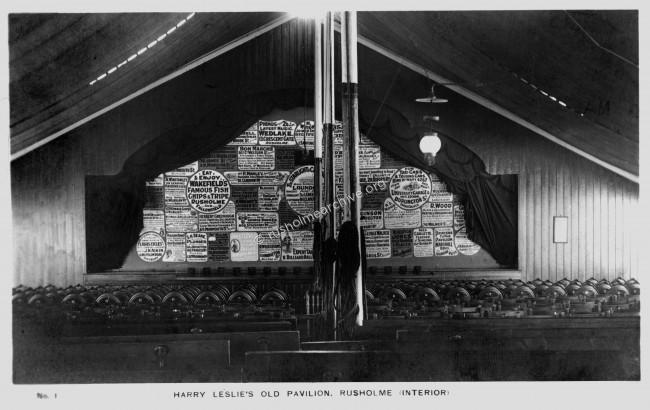
KING GEORGE V 1911 CORONATION BROOCH PIN BADGE; The photographs below are of a very small badge that Harry Leslie must have given to artistes, patrons etc during the excitement of the Coronation. Two years later King George and Queen Mary came through Rusholme when visiting Manchester, (unlikely that they visited the Pavilion!) - Read about their visit on the next item on the menu.
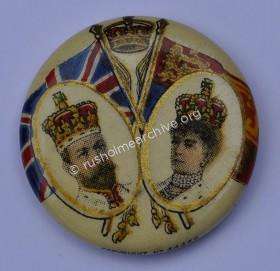
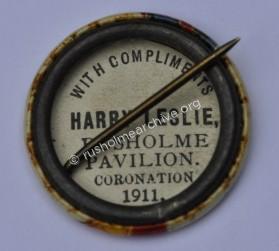
In the programmes below, (the pink one for Sept 1908), two names appeared regularly working at the Rusholme Pavilion with Harry Leslie, Cecilia Gold, (described as a burlesque actress) & Jack Waller who were a husband and wife team.
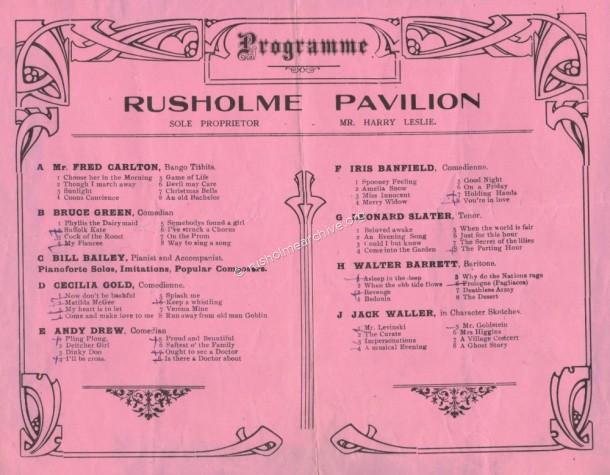
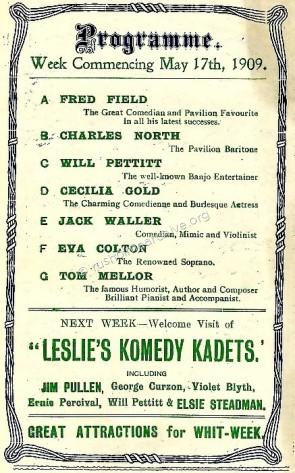
In the postcard below Cecilia Gold & Jack Waller can be seen in a troupe that Harry Leslie represented, ‘The Gay Lieutenants’. This photograph has been kindly loaned to rusholmearchive.org by Derek Tait who has a blog about Plymouth history, ( http://plymouthlocalhistory.blogspot.co.uk).
The Gay Lieutenants were appearing in September 1909 at Plymouth Pier which was one of the venues that Harry Leslie's Concert Party Agency had a contract to provide artistes.
The local paper posted the following review;
"Full of rich humour and creative of a constant flow of mirth, the entertainments of the “Gay Lieutenants” at the Pier Concert Hall this week have deservedly drawn good houses. Every member of the Company reaches a high level and the excellent judgment with which the taste of the public is gauged in the arrangement of the programme ranks the “Gay Lieutenants” in the first flight of concert parties. Chic and graceful Miss Cecelia Gold captivates the audience with her charmingly rendered songs: Mr. Jack Waller’s impersonations are irresistible; the ballad vocalists, Miss Ella Elgar and Mr. Walter Barrett are both possessed of voices of more than usual culture and powers of expression. Mr. Jack Wilcox dances a hornpipe to perfection and last, but not least Mr. F. Shepherd is an especially efficient performer on the piano".
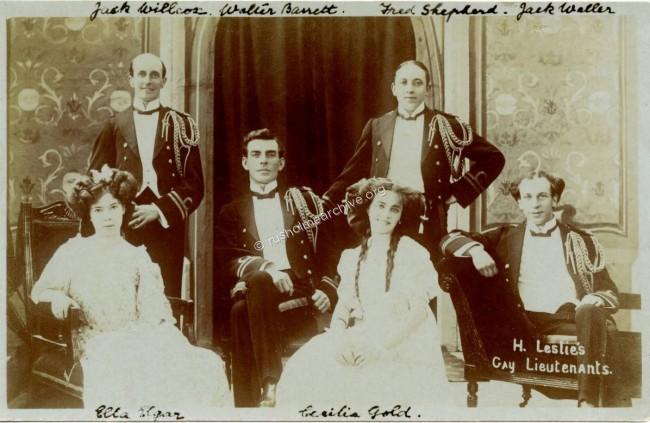
Billy Manders and his Quaintesques Drag Show
Another letter in 1980 from a Mrs Maria Hill wrote about how popular a 'Drag Show' was and she said;
'We were regular patrons from about 1930 until it closed early in the war because of the air raids, (after WW1the Rusholme Pavilion had apparently been reconstructed largely out of wood). 'We spent many happy hours there, despite its sparse appearance, but some very good turns were seen there, many better than are seen on TV today. Billy Manders Quaintesques were the most popular, as it was an all male show, the girls came in their hundreds'.
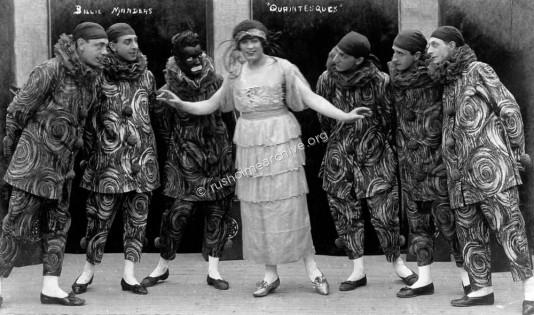
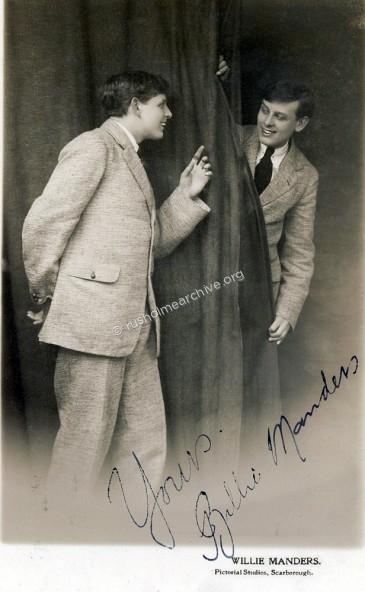
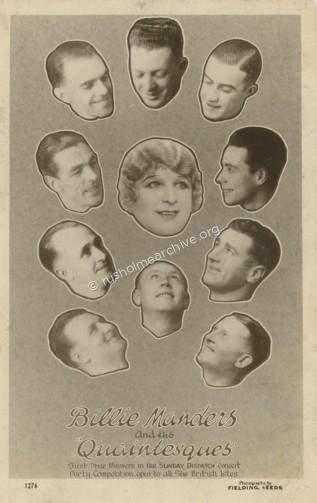
The group, 'Billy Manders and The Quaintesques' appeared regularly at the Rusholme Pavilion and were in fact a drag act led by Billy Manders who played in the summer season at Rhyl, Wales. In the card above there is a reference to the Quaintesques being voted the most popular holiday entertainment party in the British Isles. That was in 1934 and below is the cutting from the Sunday Dispatch that organised the competition.
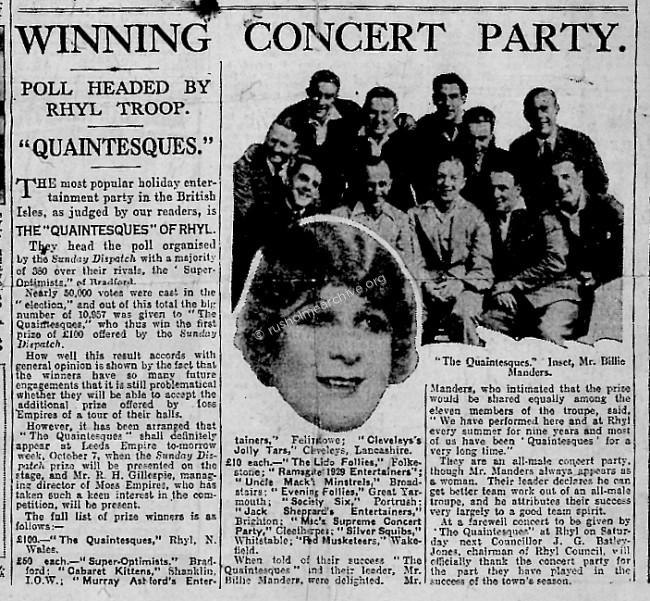
The photograph below is of Billy Manders 'In full make-up?' and the photograph beneath of the 'Quaintesques' with Billy Manders in the centre. The pictures were taken in 1930 and are from Rhyl History Club Community Archive. Billy Manders died in 1950 but under the management of Mrs Manders the show continued in Rhyl until 1962.
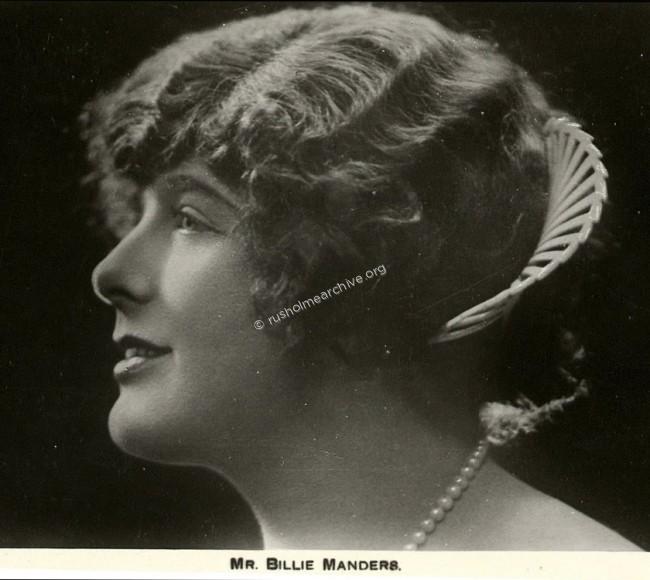
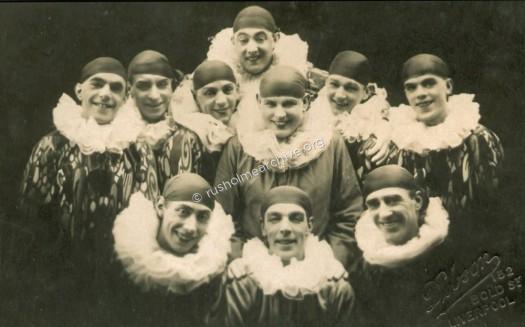
Backstage Thrill
Mrs Brice wrote in Sept. 1980,
'How well I recall Leslies Pavilion situated on Wilmslow Road, Rusholme. Mr & Mrs Harry Leslies daughter Mabel had her own act known as the 'Seven Nobodies'. Billy Manders brought his show, the Quaintesques from Rhyl to perform there. It had an all male cast (in drag) and very popular it proved to be. My uncle, Chris Booth, was the doorman at the Pavilion and as a child I was privileged to go backstage and meet the artists. Quite a thrill for a little girl then! How we all enjoyed those happy shows. A weekly visit to the Pavilion was a 'must' for most Rusholme residents'.
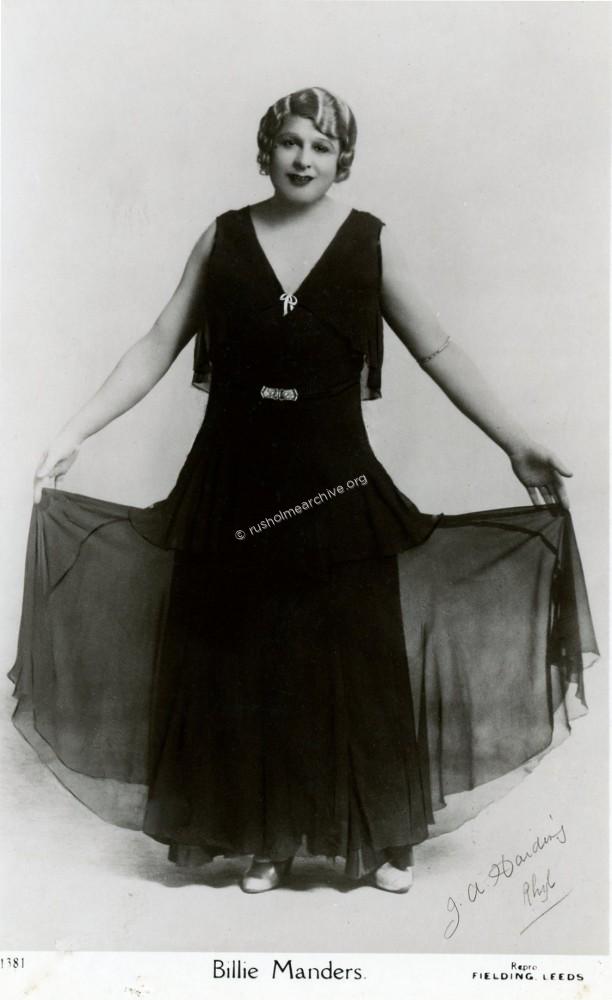
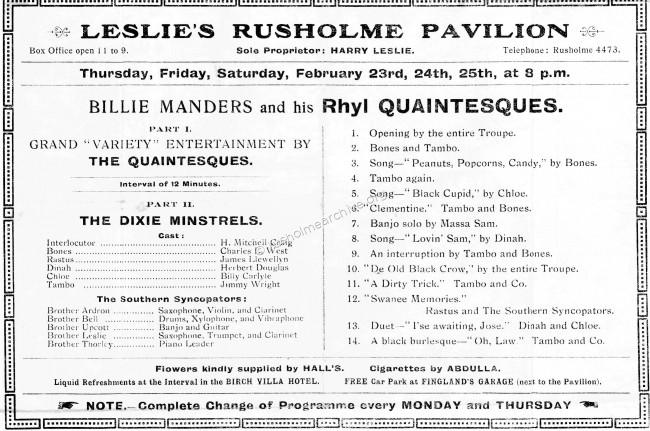
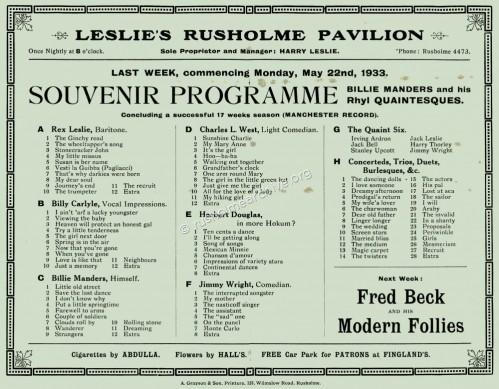
Will Catlin's Royal Pierrot's in the postcard below played at Leslie's Pavilion. This troupe had their summer season on the East coast, playing at Scarborough, Whitley Bay and as in this card, at Great Yarmouth. Will Catlin's daughter, Gladys, married Billy Manders.
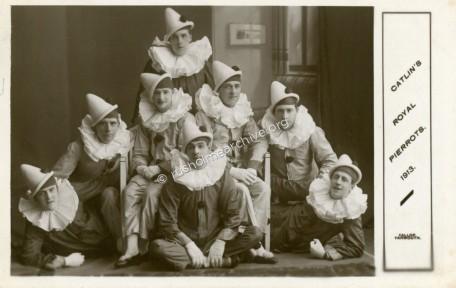
Photograph below is of another troupe that appeared during the 1920's at the Rusholme Pavilion, Earnest Crampton's 'The Curios'
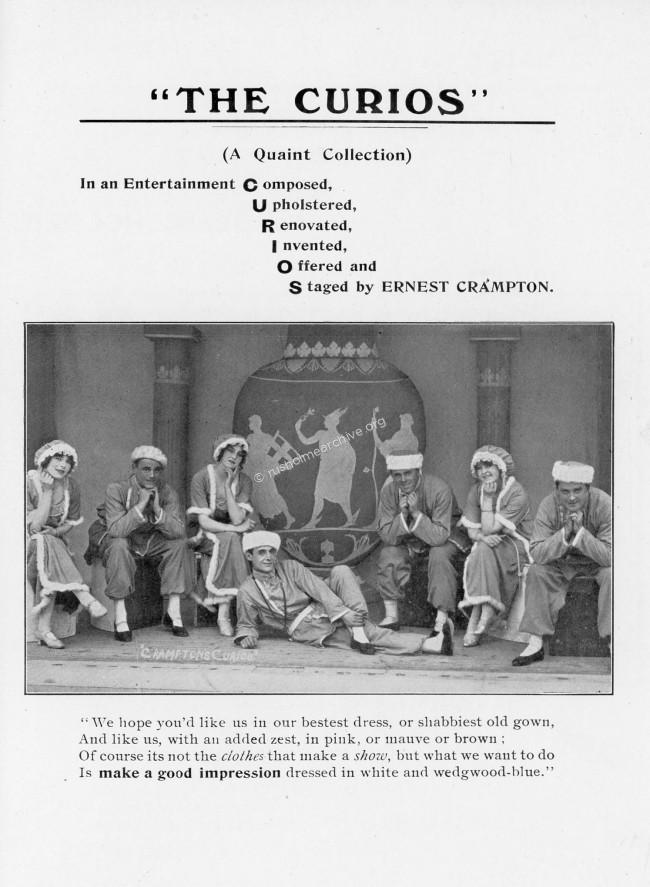
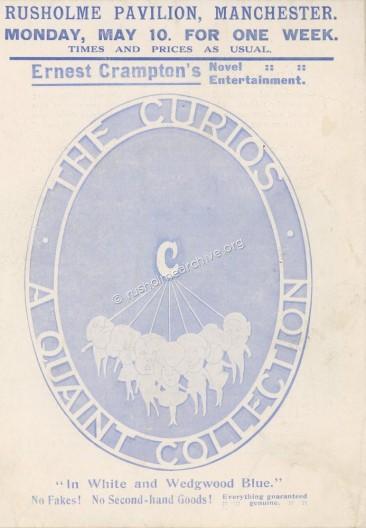

Ernest Crampton was a prolific author/composer of concert party songs, many of these were recorded and can be seen in record archives. Like Harry Leslie he was also a promoter of touring concert parties, the photograph below is another of his touring companies.
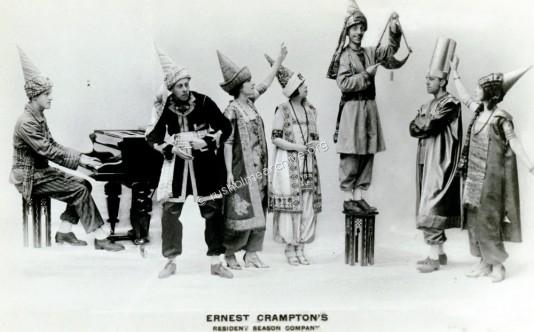
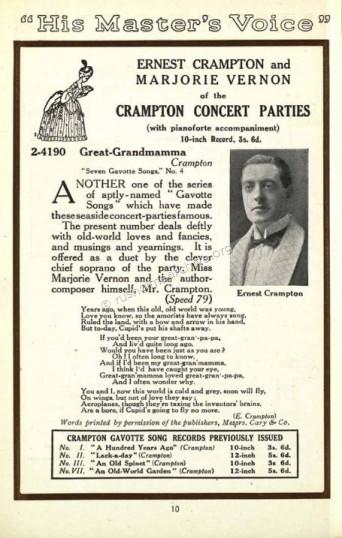
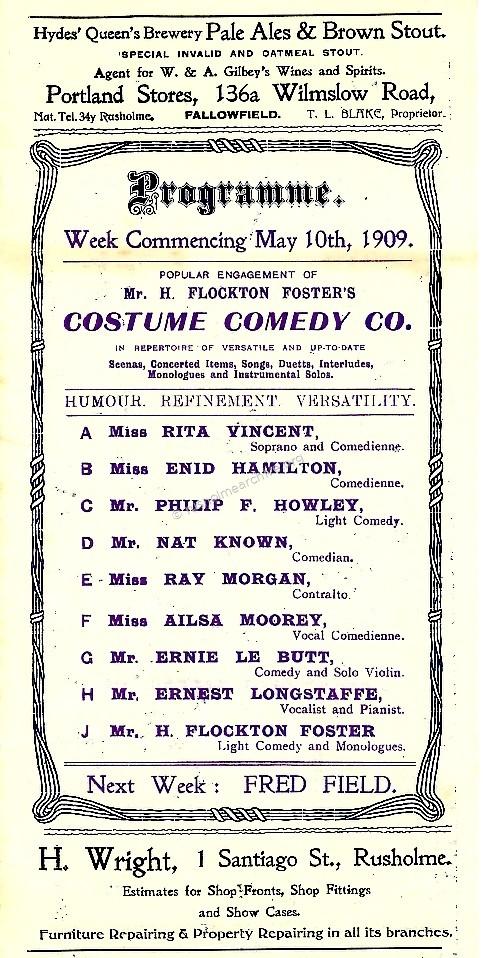
Look at the advert in the programme above for H. Wright and then look at the phtograph below - the young man in the centre could have smiled for the camera!
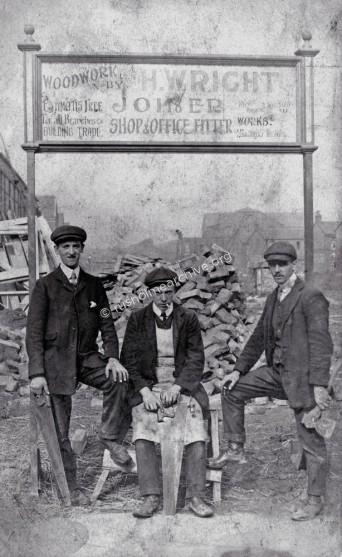
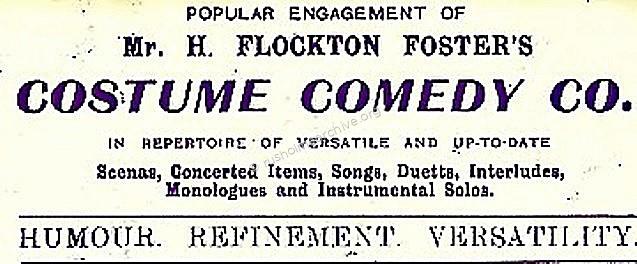
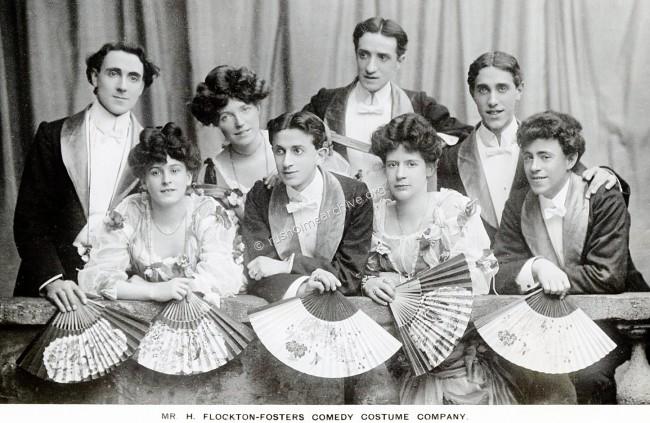
Click on the first picture below to open the gallery!
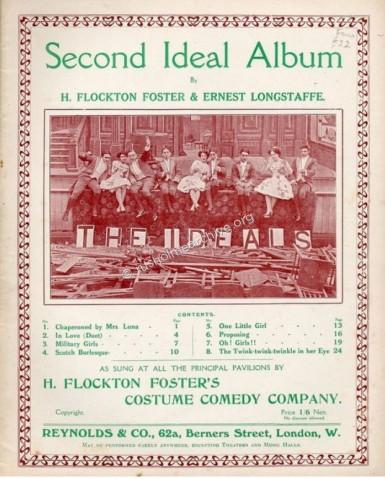
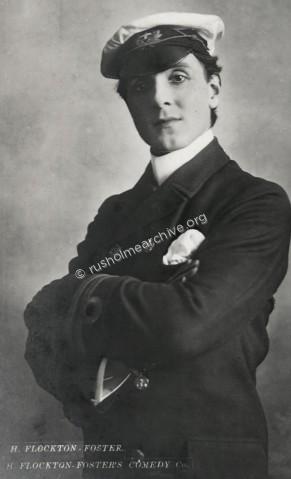
Harry Flockton-Foster was born in Wakefield in 1876. He originally worked in the woollen trade but in 1898 he seems to have started working as an entertainer. An advertisement in a Leeds newspaper refers to the various concerts that he and his wife could perform in. With Rita they travelled extensively, not only appearing with his 'Comedy Concert Company', but singing solo and appearing in pantomine. They certainly appeared in the Rusholme Pavilion in 1909. During WW1 he toured Australia with a company called the Gaities. He died in December 1947 collapsing at Gloucester Railway Station after a rehearsal at the Gloucester Operatic and Amateur Dramatic Society.
Miss Rita Vincent, (photo below), billed as a soprano and comedienne was the wife of Harry Flockton Foster.
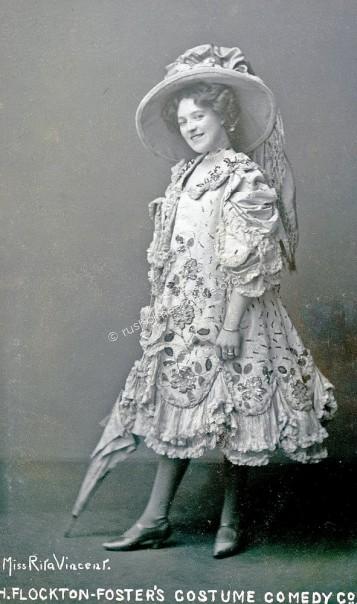
The two photographs below, (dated 1909) also of H. Flockton Foster's Costume Comedy Company appear by courtesy of the Greater Manchester County Records Office, the photographer being C. Heaps. I appreciate the help of the GMCRO in finding these postcards.
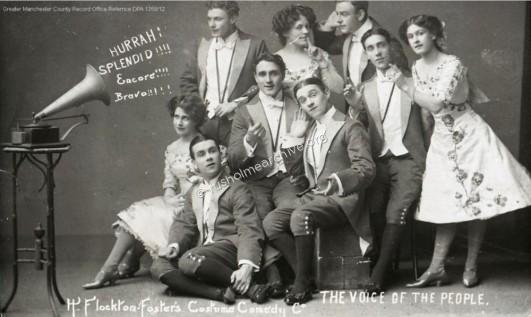
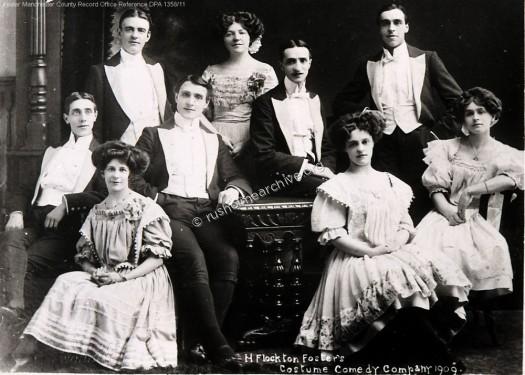
The photograph below was taken in 1934 to celebrate the 25 years of concert parties at the Rusholme Pavilion.
The Cotton Queen, (Miss Gladys Wood of Salford who was an employee of Henry Bannerman & Co), is centre stage with the bouquet of flowers, Harry Leslie is to her left.
Cotton Queens were an early attempt to market and promote the cotton industry in 1930 using women workers from within the trade itself (other industries also did this) to market and promote the cotton industry, especially beyond Lancashire. The development of this form of advertising came at a time when the industry was in decline and therefore attempting to raise its profile, both at home and abroad. Each year a Cotton Queen was elected and, and to be eligible to enter a girl had to work in the cotton industry and be aged between 16 and 26. Would be Cotton Queens had to send their photo in to the newspaper. As many as twenty towns, would then elect a local queen. All the local winners then went to Blackpool for a few days and the national queen was chosen in a ceremony at the Tower Ballroom. It was a prestigious, exciting and glamorous role being the Cotton Queen because for one year she did not have to work in the usual way but travelled the country, with a chauffeur and chaperone, promoting cotton goods. Cotton Queens were not just pretty faces, and were expected to write and deliver their own speeches, as well as undertaking an ambassadorial role on behalf of the entire industry. The promotion for this quest to find a new Cotton Queen each year was organised by the Daily Dispatch. The outbreak of the Second World War meant that the reign of the final Cotton Queen, Miss Preston, ended rather abruptly in September 1939 while she was on official duties in Scarborough. After the war the competition was never revived and the Daily Dispatch also ceased publication.
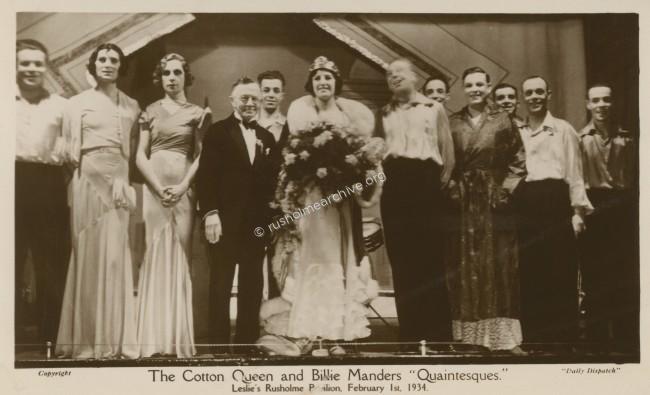
Betty Driver, well known star from Coronation Street.
Betty Driver (1920-2011) lived in West Didsbury, Manchester as a child where her father was a police officer. The Rusholme Pavilion was not far from Didsbury and it seems that her parents took her to the Pavilion to see the Quaintesques; to quote Betty Driver,
'I was seven & a half when we set off to see a touring company called the Quaintesques, a group of men dressed as women. The show was going on when the star Billy Manders asked the audience to join in with a chorus. I got carried away, booming away in the back row, and at the end of the song Billy asked me to come forward and sing with him. We brought the house down and I was presented with a jar of toffees - my first fee! '
Betty Driver had a long and varied career following her first turn on a stage in Rusholme - a comprehensive biography is at Wikipedia.
Mrs Hill described Harry Leslie as a surly type who rarely smiled,' but we knew if business was good because he would wear a flower in his buttonhole', others referred to him as a small dapper man who looked more like a lay preacher that a concert promoter. Other members of the family worked with him at the Pavilion, his mother Isabella worked in the box office, his sister-in-law Minnie also helped at the box office. His daughter Mabel became the company manager after serving her 'time' in the Nobodies, a very popular troupe that Harry Leslie created.
Photo below of the Nobodies
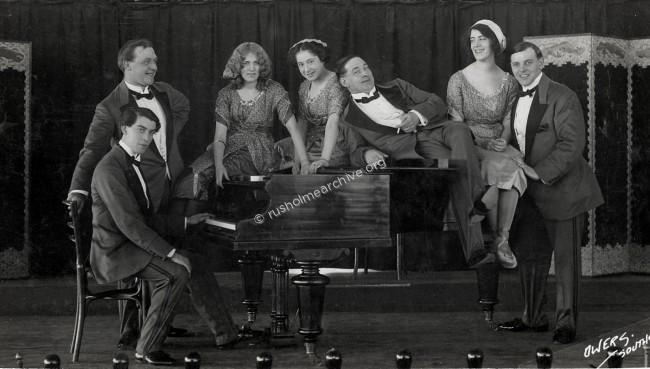
Photo below is an autographed portrait of Mabel Leslie dated 1917
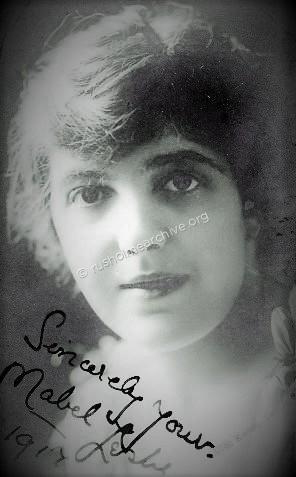
The poster below is for a production in February 1932, with Mabel playing a leading role. Described as 'The Sweetest story ever Written' with Power, Pathos and Comedy' it ran for six nights, unfortunately I have not been able to find a review!
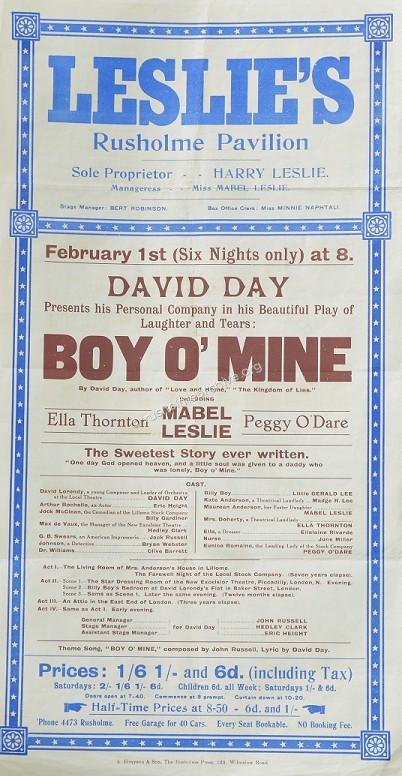
The poster illustration below is probably from a May 1914 production. The poster was at Oxford Road railway station and was very big, approx 250 square feet. Freddy Batters was a Nottingham comedian who regularly performed with 'The Nobodies'.
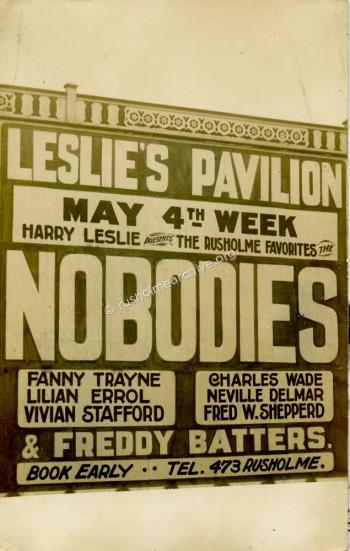

Over time I have managed to find some photographs and information about some of the artists appearing in the May 1914 production above, see below.
Photograph below is a autographed portrait of Freddie Batters - at the bottom of the image a faint note;
Harry Leslies 'NOBODIES' War Charities.
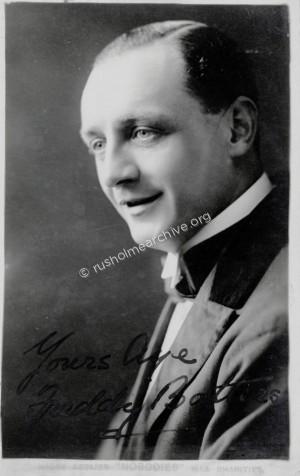
Photograph below is a an autographed portrait of Frances (Fanny Trayne),
she is billed in the poster above, - at the bottom of the postcard again was a faint note; Harry Leslies 'NOBODIES' War Charities.
To quote from the Era newspaper; "Miss Francis Trayne, soprano, has a charming voice, and always does well, her rendering of ‘Dearest Heart’ and ‘Fairy Dream’ being a fine exhibition of vocal skill".
The Era, September 1913
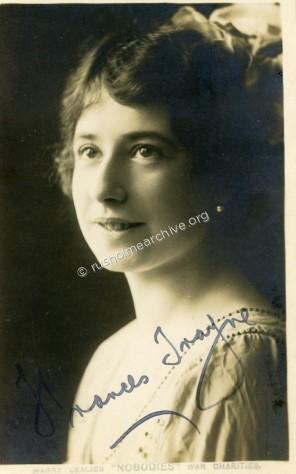
Below is a photograph of Lillian Errol, (and Harry Leslie).
Lillian Errol travelled extensively appearing in theatres across the UK. She regularly appeared in pantomime productions, in The Stage, 3rd February 1910, the review refers to Miss Lillian Errol;
“Charming as Cinderella, alike in acting and in singing she is admirable. Her numbers, ‘Little girl from no man’s land’ and a pleasing song, rendered with artistic success in the Kitchen scene, are the best numbers in the pantomime. She is daintily gay in many up-to-date ditties and dances”.
She married the music hall comic Harry Angers and she eventually became one of the Fol de Rols . Her daughter was a well-known actress, Avril Angers.
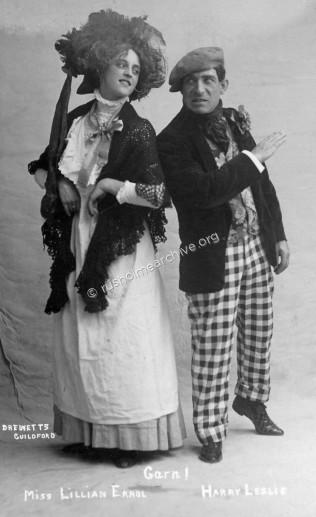
Photo below is Neville Delmar. Neville Delmar was born in Brighton in 1885. I first found a reference to him in 1907 when he was appearing on Hastings Pier, the production was Harry Reynolds Minstrels and Neville Delmar was described as ‘A clever whistler’. Over the next 30 years his name regularly appeared in productions, particularly in Northern resorts and billed as a comedian and dancer. In 1940 he was featured on Radio Luxembourg where he presented the Ovaltineys. After WW2 he advertised in The Stage as a Stage Manager or Director. He died at Bolton in 1952. If you would like to hear the Ovaltineys click here
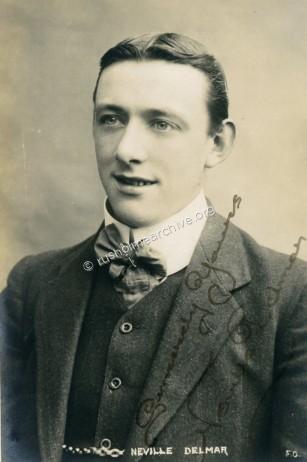
I have found a review of Neville Delmar dated 1910 when he was working at Exeter in Devon - I also have a photograph with his 'Cadets'.
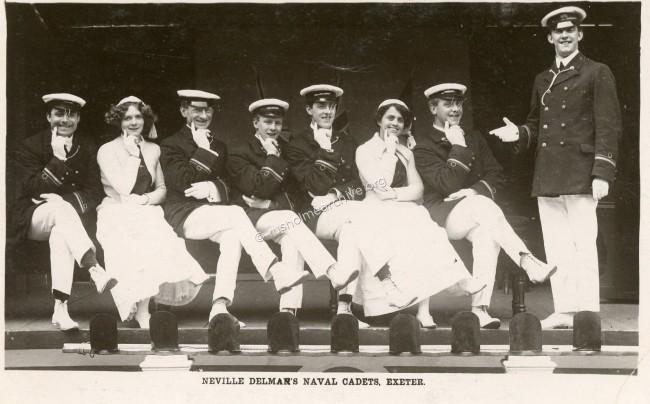
NAVAL CADETS AT EXETER. Mr Neville Delmar " BENEFIT " AND PRESENTATION.
The Naval Cadets party gave an excellent concert at the Barntield Hall. Exeter, last night, as complimentary benefit to Mr. Neville Delmar. There was large attendance, and encores were so numerous that, although the concert lasted nearly three hours, many items had be "cut." The programme was contributed to by Miss Nellie Comber, Mr. Jaxon Hilton, Mr. Ernie Shannon, Mr. Will Rogers, Mr. Charles Wade, Miss Fanny Adamson, Mr. Charles West, and Mr. Neville Delmar (who was the recipient of a couple of presents from the "front " and of a handsome writing case from the company, made Mr. Charles West, in a happy speech, which was suitably acknowledged). Mr. Wilfrid Heath (late principal baritone Moody Manners Opera Company) Mr. Ernie Ellis, and Mr. Frank Beer. There were several excellent concerted numbers, and the entertainment, as a whole, was very enjoyable.
Mrs Hill drew attention to two artistes who had appeared in the Pavilion before they became better known.
Most notably perhaps was Beryl Reid who lived locally and after an audition was given just one weeks work. Mrs Hill said that she saw her perform on her second night, 'and very good she was too'.
The other artist was the piano player at the Pavilion, Jack Parker. He left Rusholme to work in London and having changed his name he achieved success as the co-writer of 'There will always be an England' in 1939. This song was a particular favourite of Vera Lynne and was a great hit during WW11. Here is some biographical information from Wikipedia about these two artists.
Beryl Elizabeth Reid, OBE (17 June 1919 – 13 October 1996) was a British actress of stage and screen. Born in Hereford, England in 1919, Reid was the daughter of Scottish parents and grew up in Manchester where she attended Withington and Levenshulme High Schools. Reid applied for and was accepted in a revue in the summer season in Bridlington in 1936. She had no formal training but later appeared at the Royal National Theatre in London as a comedy actress. Her first big success came in the BBC radio show Educating Archie as naughty schoolgirl Monica and later as the Brummie, "Marlene".
Her many film and television roles as a character actor were usually well-received. She reprised her Tony Award-winning performance of a lesbian soap opera star in The Killing of Sister George for the screen version and was nominated for the Golden Globe Award for Best Motion Picture Actress in a Drama. The former tour of the play was not a success, people in shops refused to serve her and other performers due to the gay characters in the play.[3]In both Tinker, Tailor, Soldier, Spy and Smiley's People Reid played Connie Sachs. For Smiley's People she won a BAFTA for Best Actress on Television. She also wrote an autobiography, So Much Love, which was well received. She played the part of an elderly feminist and political subversive in the 1987 television drama Twice married, but childless, Beryl Reid died from pneumonia and osteoporosis.
Albert Rostron Parker started his career as Jack Parker playing the piano at the Rusholme Pavilion. "There'll Always Be an England" is a patriotic song, written and distributed in the summer of 1939, which became highly popular upon the outbreak of World War II. It was composed and written by Ross Parker born, 16 Aug 1914 in Manchester) together with Hugh Charles (born Charles Hugh Owen Ferry, 24 Jul 1907 in Reddish, Stockport, Cheshire), and a popular version was sung by Vera Lynn
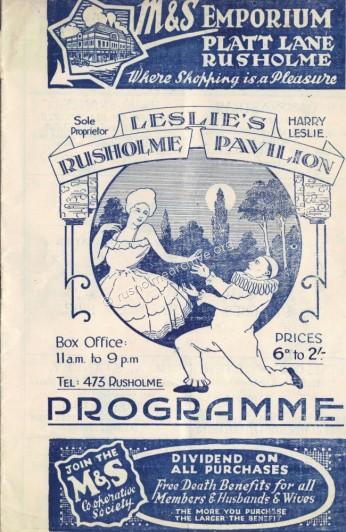
Pierrots, always popular
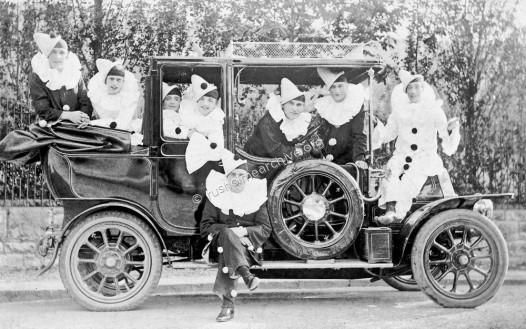
Harry Leslie lived for some years on Platt Lane in Rusholme and in addition to the Rusholme Pavilion Concerts he seems to have run a successful Artists Agency managing a number of artists. In the 1914 Annual Stage magazine he had an advertisement listing a substantial number of 'turns' who he represented including the
" BROWNIES. " " CANTABS." " CORINTHIANS. " " EUTERPIANS. "
" EXCELSIORS. " " GAIETIES." " GAY LIEUTENANTS. " GEMS." " GROTESQUES."
"HARMONICS." "HUMORESKS." " IDEALS." " MARCH HARES." " NOBODIES."" PIERROT,
PIERRETTE AND PIANO." " POPPIES." " QUAINTS." " SEQUINS." "VAGABONDS." &c., &c.,
Photo below is of the 'Gaieties'
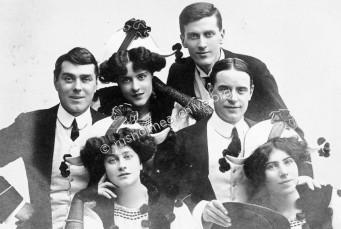
Photo below is1928, 'The Squibs'
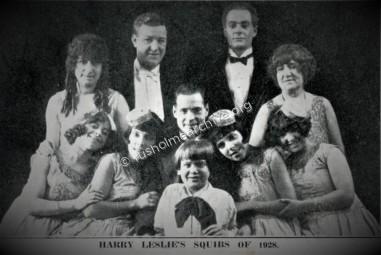
Another troupe of pierrot's that Harry Leslie represented, the strangely named 'Grotesques'. The image below, a hand-colured postcard is undated, however searching The Stage, I found references to the troupe in 1914.
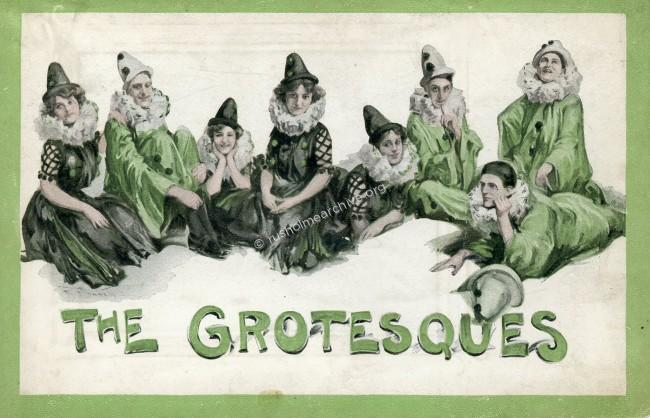
The advertisement below appeared in The Stage' magazine in February 1920 and clearly shows the extent to which Harry Leslie had become as an agent. I should like to thank the Stage magazine for giving me permission to reproduce the advertisment.
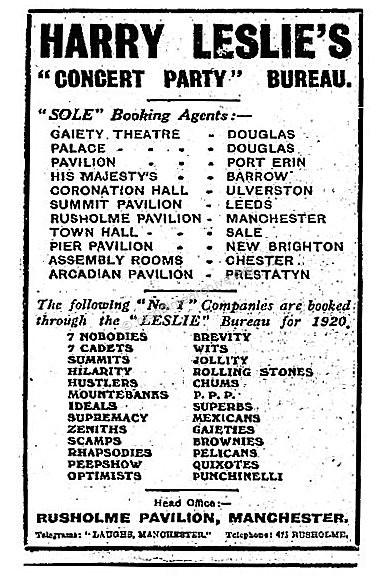
Other popular names that appeared regularly at the Rusholme Pavilion included Leslie Henson, Claude Hulbert and Clarkson Rose. There is some biographical information from Wikipedia about these artists below.
Clarkson Rose. Born in Dudley, Worcestershire in 1890 as Arthur C. Rose. He began his career as “A.C Rose- Comedian”, making his first appearance on stage in 1905 at the Mechanics Institute, Dudley. And later forming his own concert party. He was later to present his own Summer Show “Twinkle” at seaside resorts for over forty years.He always claimed his favourite role was Widow Twankey, in “Aladdin”. Clarkson Rose’s last pantomime was at Leicester in 1967. He died on 23rd April, 1968.
Leslie Lincoln Henson (3 August 1891 – 2 December 1957) was an English comedian, actor, producer for films and theatre, and film director. He initially worked in silent films and Edwardian musical comedy and became a popular music hall comedian who enjoyed a long stage career. He was famous for his bulging eyes, malleable face and raspy voice and helped to form the Entertainments National Service Association (ENSA) during the Second World War. Henson died at his home in Harrow Weald, Middlesex, in 1957, aged 66
Claude Noel Hulbert (25 December 1900 – 23 January 1964) was a British comic actor. He was the younger brother of Jack Hulbert. Like his brother, he was Cambridge educated and was a member of the Footlights comedy club as an undergraduate.
His subsequent career was less successful than his brother's, it seemed that British studios simply didn't see him as a major star. Claude's film appearances became scarcer as the 1940s wore on. His films, however, were, at best, modest and moderate, sadly lacking in budget, ambition and spark.
Hulbert died in a hospital in Sydney, Australia, whilst ashore from a world cruise with his family
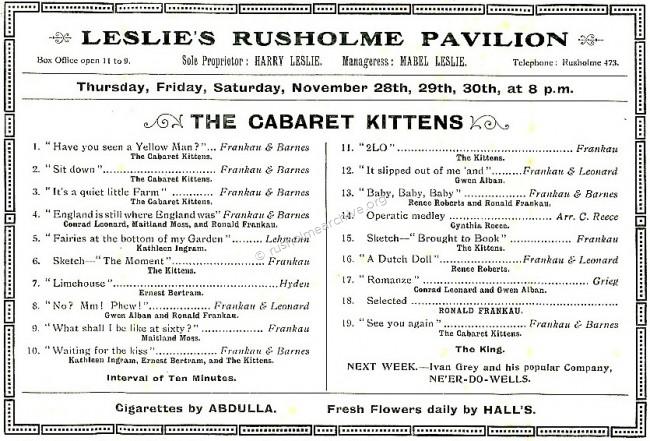
Ronald Frankau (22 February 1894 - 11 September 1951) was an English comedian and musician from London who started in cabarets and made his way to old-time radio and movies.
In 1925 he started broadcasting saucy jokes on the radio in an Etonian tone for the BBC, but is actually better known these days for what he was never allowed to broadcast. Frankau recorded a number of songs and skits on Parlophone, some of which, like Winnie the Worm and Everyone's Got Sex Appeal For Someone, were banned altogether.
If you would like to listen to Ronald Frankau reciting monologues click on the link below, (courtesy You-tube)
I have also acquired the following postcard,, undated it does seem that perhaps dogs were welcome!
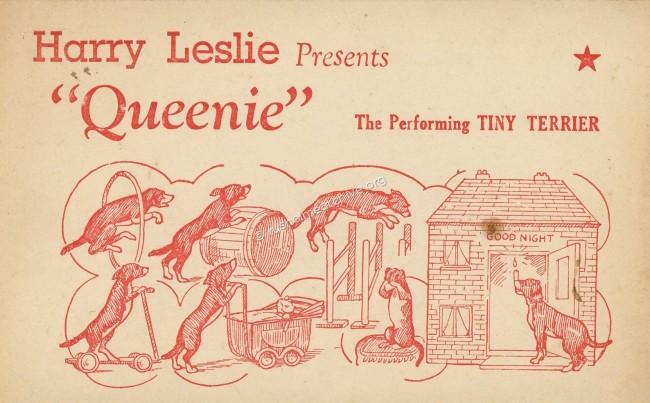
South Manchester Amateur Operatics was established in 1911 and used the Pavilion for their Annual Productions. The production of 'Dandy Dick' was in 1913 and 'Mrs Gorringe's Necklace was in 1925.
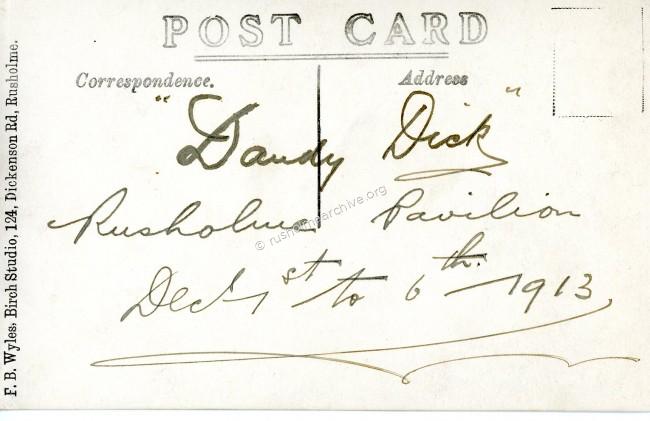
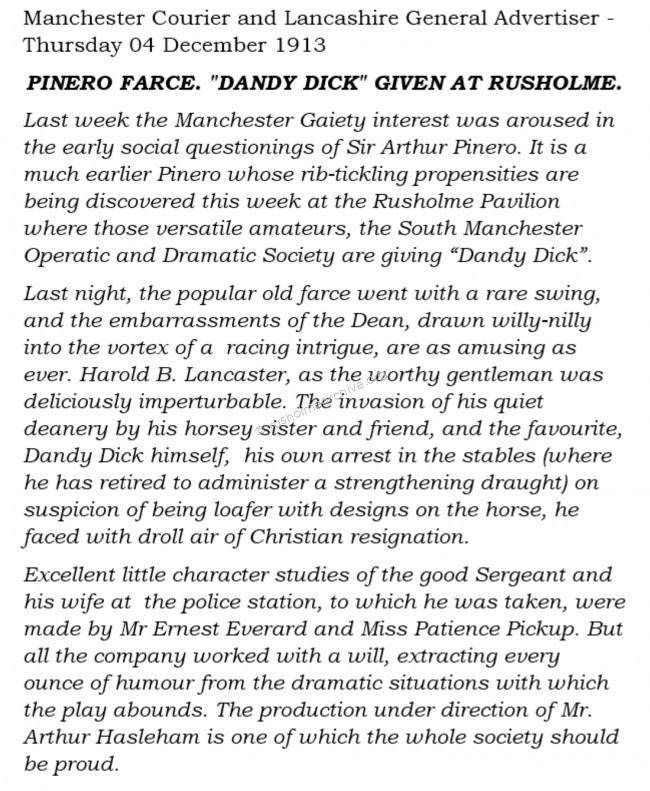
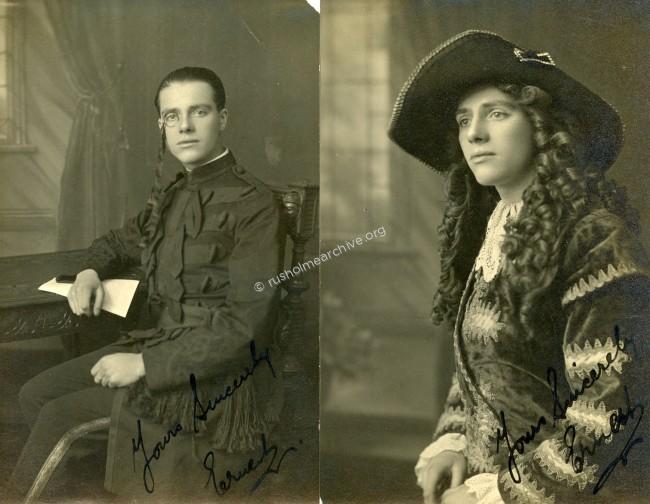
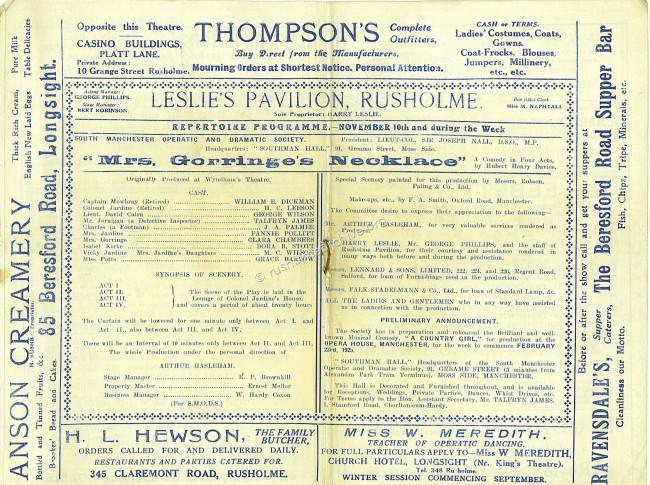

The article beneath appeared in 'The Stage' in October 1928. It refers to Harry Leslie celebrating 25 years of production at the Rusholme Pavilion which would appear to indicate the Pavilion opened in 1903, (?). Once again I should like to express my appreciation to 'The Stage' magazine for giving me permission to reproduce the article.
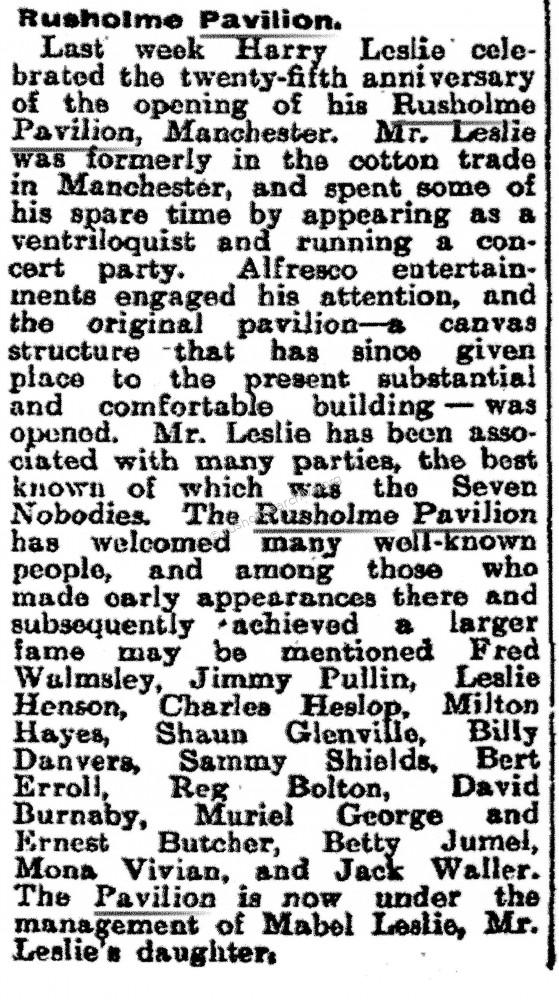
Harry Leslie worked hard raising money for a wide range of charities. There were a number of mentions in the press regarding his charitable work and I have highlighted some below.
In 1903 he received thanks from Mr Tootal-Broadhurst, Chair of the Manchester & Salford Lifeboat Fund for 'the many and delightful entertainments that he arranged' for the thirteenth annual fundraising celebration. In 1912 when the Lord Mayor opened a fund to relieve the distress caused by the sinking of the Titanic, again Harry Leslie organized collections at the Pavilion.
World War 1 There were regular collections By Harry Leslie & patrons of the Rusholme Pavilion to help fund the war effort - a hospital bed was named after him at Willow Bank, a Red Cross Hospital nearby on Moss Lane East.
Photo below of soldiers and staff at Willow Bank Hospital dated May 15th 1918
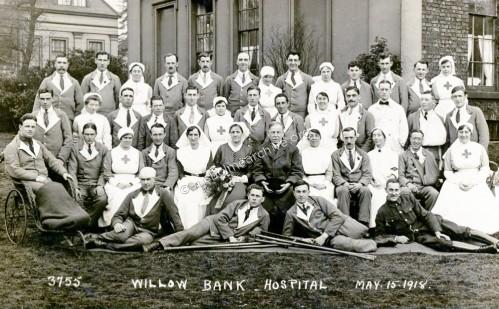
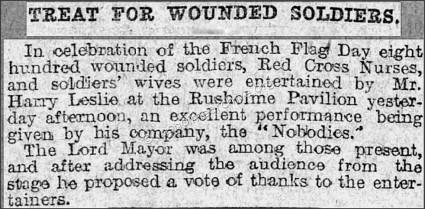
The photograph below is at present an unknown location, the back of the card refers to a Rusholme Military hospital; (the note on the bed is seen in close-up) refers to five beds supported by patrons of the Rusholme Pavilion, whilst the other bed refers to the ‘Ladies Committee’ of Rusholme Pavilion supporting this particular bed. The interior of this building certainly does not look like any of the schools used in Rusholme as hospitals; Is it a picture arranged in the Rusholme Pavilion perhaps? Most surprisingly Harry Leslie does not seem to be in the photograph.
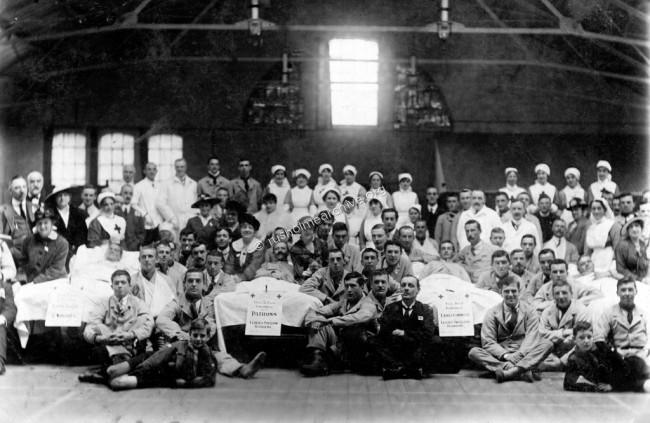
Close-up below shows notice on beds referring to Rusholme Pavilion supporting the patients
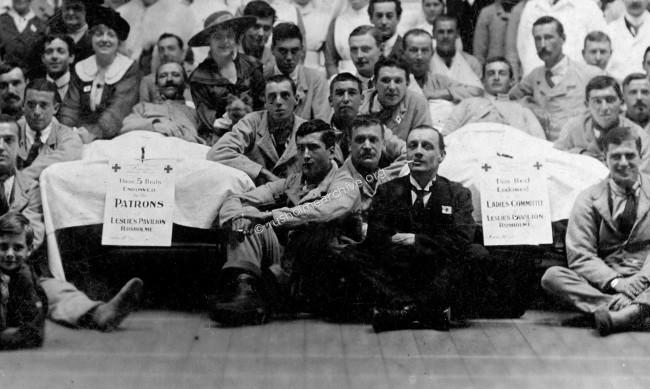
In 1917 William Royle chaired a committee to open a Day Nursery in Rusholme. Many women were now working as a consequence of the war - there were war widows needing help looking after their children. Harry Leslie undertook to raise the £40 annually needed to rent a suitable house where children under five could be fed & cared for all day for 10d until their mothers could return from work. It seemed to be very successful , at the end of the first twelve months the Nursery committee reported that,
"Started in November, 1917, the nursery, situated as it is in a residential district of the city, was regarded in some measure as an experiment. It is an experiment which has been justified by success in the first year. In the course of twelve mouths the number of children in attendance has risen from 11 to 37 and a nursery school teacher has been added to the staff of matron, staff nurse, and two probationers. In admitting children preference is given to those whose mothers are obliged to go out to work. Of the mothers using the nursery 76 are soldiers' wives, eight are widow of soldiers, six are widows of civilians, twelve are unmarried mothers, four are deserted mothers, and 19 are the wives of civilians. The Chairman spoke of the physical and intellectual wellbeing of the children, instancing cases of 'a sickly child's being restored to robust health and of the dull boy being made bright by patient and intelligent tuition."
Harry Leslie Testimonial
In October 1934 various theatre managers in Manchester planned a testimonial for Harry Leslie and this extract below from a local paper perhaps indicated the high esteem in which Harry Leslie was held.
A special performance will be given at the Rusholme Pavilion, Manchester, on Friday evening, November 2, in aid of the testimonial fund for Mr. Harry Leslie, who completed thirty years of management at the Pavilion early this month. Having regard to Mr. Leslie's services to social and charitable causes in the city, it was decided that some testimonial should be presented, and a representative committee, by whom the special performance is being organised, is to be formed.
Although the Rusholme Pavilion was managed by Harry Leslie from 1903-04 until 1941 there were three periods when concert shows were not being performed. At a very early stage Harry Leslie started to show silent films, but he decided that movies 'would not catch on' - perhaps he proved better on his choice of artists for the concert shows than judging the future of the cinema. Then for a year in the 20's he tried repertory, but again he went back for his successful formula of concert shows. Finally in 1932 he thought that the competition from the cinema could only be met by opening a boxing ring - so the Rusholme Pavilion put on boxing matches. However after a short season he was back with his beloved concert parties until 1941 when he finally closed the doors.
Between 1935 and 1939 the BBC broadcast productions from Leslie’s Pavilion, presumably the ‘Northern’ was the local BBC Home Radio, the listing below was shown in all the Northern regional papers.
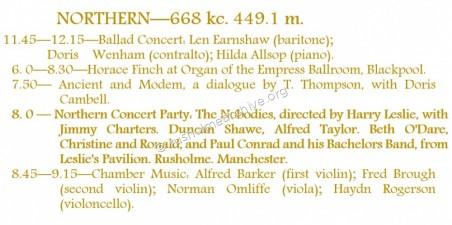
WW11 Concert
I have recently acquired a concert programme that I think is probably dated 1939 or 1940.
Clearly marked on the front cover Dec. 4th to Dec. 9th but no indication as to which year. As the Rusholme Pavilion closed in 1941 the event, "Manchester Kentucky Minstrels", must have been in one of the two preceding years.
The concert, featuring the 'Manchester Kentucky Minstrels, was a band formed in 1933 and apparently very popular. I have digitally searched local newspaper through 1939 until December 1941 but can find no reference to the concert that Harry Leslie was promoting to raise funds for the Daily Dispatch and Evening Chronicle WAR RELIEF FUND.
Below are the images that show not only the programme, but as interestingly advertisements from local Rusholme shops etc.
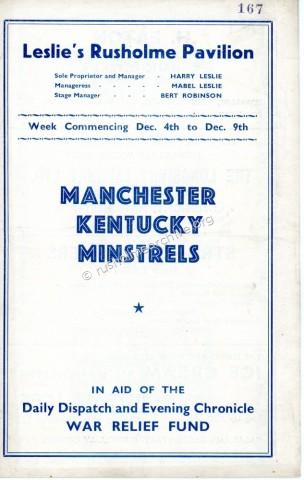
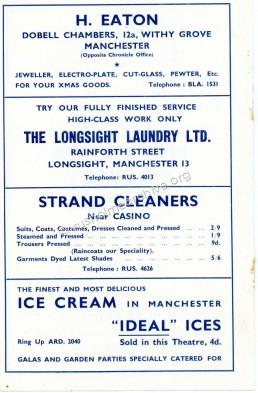
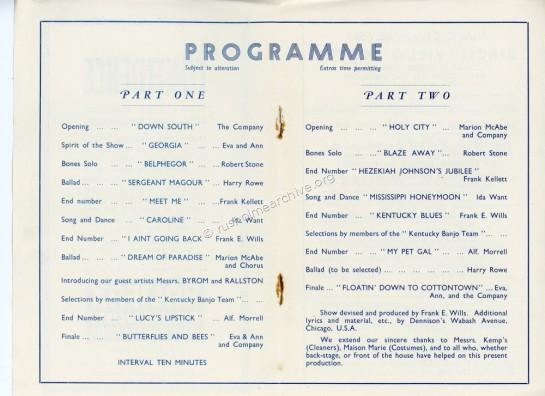
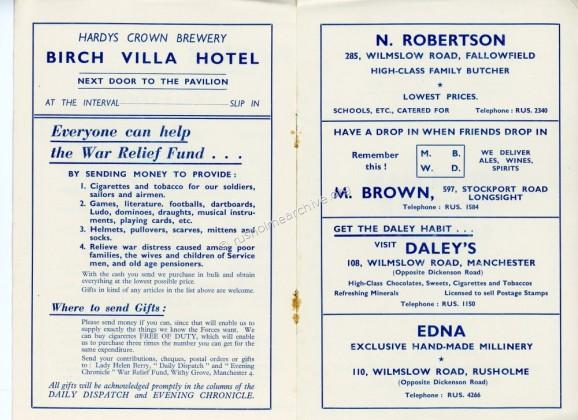
Manchester Evening News Headline 1944
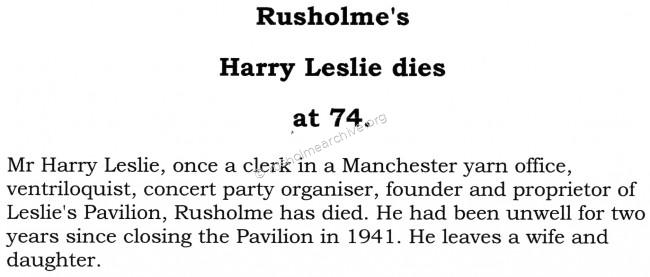
Harry Leslie died in hospital on the 18th March 1944, he was buried at Brooklands Cemetery, Sale on the 22nd March 1944.
Below, unknown newspaper cutting of Harry Leslie's obituary.
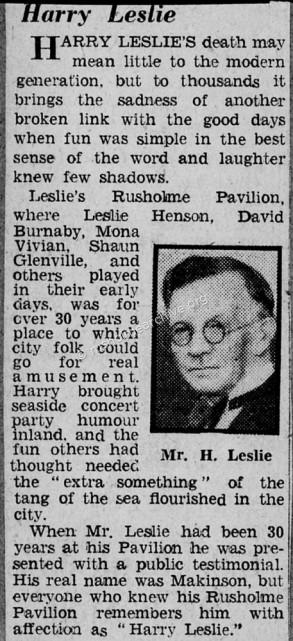
Below are more examples of the programmes from 1908-09
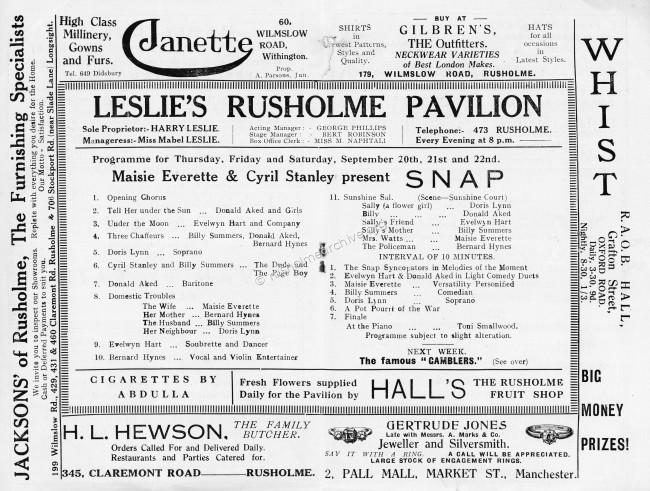
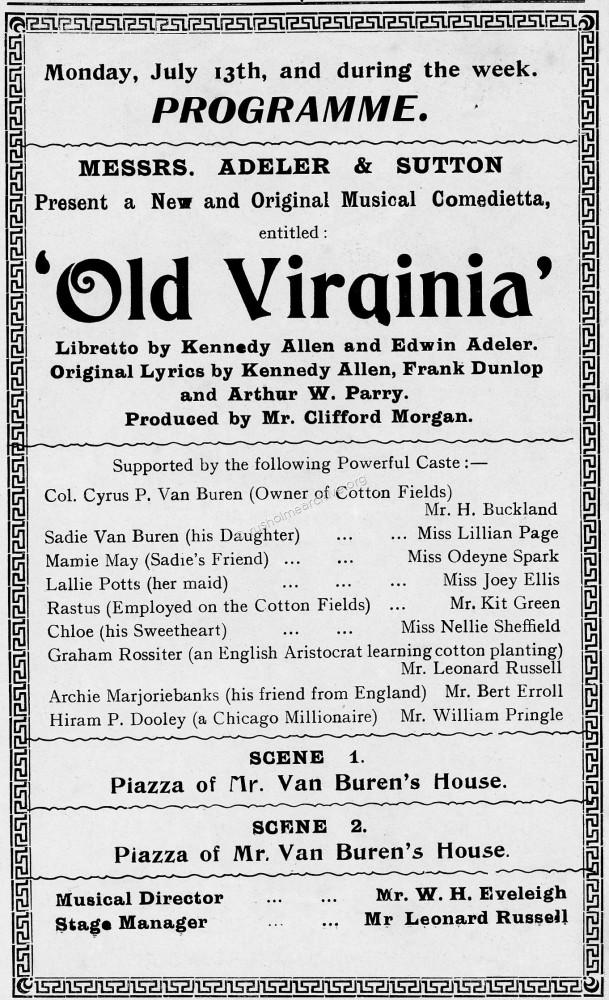
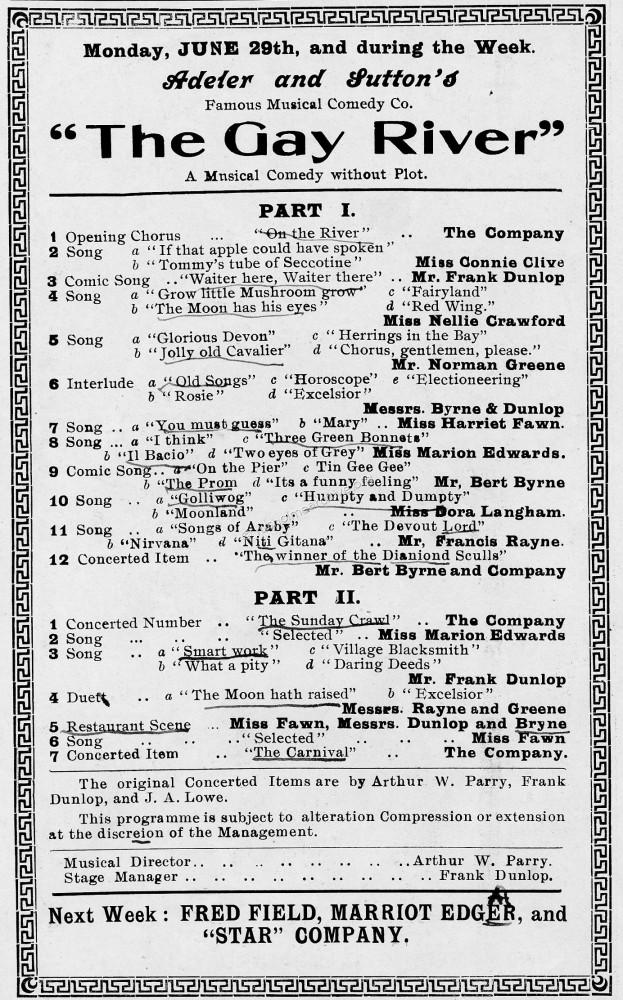
If you like to read more about Concert Parties and the entertainers that were so popular in Rusholme there are two books that I found through the Abe book search website. I have reproduced the covers of the books below and trust that the publishers do not feel that this is to much of an incursion into their copyright rules..............
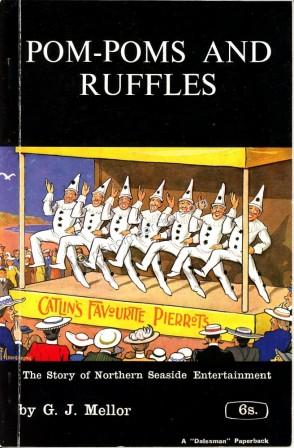
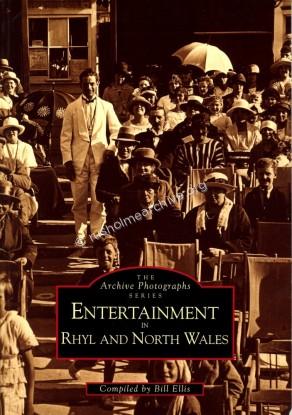
I was fortunately able to talk to the author of the above book, Bill Ellis, and would like to thank him for providing me with some new information about Billy Manders & the Quaintesques.
'Grand Finale'
You may enjoy looking at the small advertisements which surround the programmes. I have put together a gallery below that you may find interesting.
Just click your mouse on any image & it will expand
